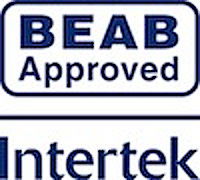With strict testing standards, the BEAB Approved Mark is a trusted sign of the quality and safety of electrical products. For approved products, the mark demonstrates to everyone that the UK’s leading independent approval specialists have evaluated it to the highest European and international standards. But what does it take for manufacturers of electrical appliances to go above and beyond the standards?

Recognised across the UK and Europe, the BEAB Approved Mark demonstrates the safety pedigree of certain electrical products. According to Intertek, the independent organisation which grants BEAB approval, it also shows a manufacturer’s ‘commitment to best practice, its commitment to producing quality goods and most importantly its commitment to the safety of customers’. For some manufacturers, BEAB represents a minimum standard required to ensure safety and compliance. For others, it provides a benchmark to be beaten.
With nearly 70 years’ experience in developing electric heating products, Dimplex believes that it knows more than any other company about electric heating and it has helped to shape the testing regime for BEAB over many years. More importantly, the manufacturer continues to go ‘beyond BEAB’ in a bid to ensure the highest possible standards of safety for homeowners.
Eleven product categories covered:
Chris Stammers, marketing director at Dimplex, says: “The BEAB Approved Mark applies to a list of eleven product categories from heating appliances and refrigeration equipment, to power supply units and instrumentation. Each category has its own specific challenges and testing requirements but the electric heating sector is unique.
“Unlike most other appliances, electric heating products combine a high electrical load with the potential of continuous usage over long periods. A storage or panel heater, for example, can draw two or three kilowatts throughout the day and night, unlike other high load appliances such as ovens, which are mostly used in short bursts. And for manufacturers – together with testing body Intertek – this raises very special challenges.”
As one of the oldest companies in the Glen Dimplex Group, Dimplex has risen to these challenges and today sets the template for testing of electric heating products.
Stammers adds: “We have been dealing with electric heating products for many years and - recognising the unique application of such appliances - we have designed our products specifically to combat the safety challenges posed. The use of robust materials and safety cutout switches are just some of the features that ensure that the majority of our portable heaters, installed heating appliances and electric fires are BEAB approved.”
Rigorously tested independently:
BEAB approval is a significant demonstration of quality and safety. It means that the product has been rigorously tested in an independent accredited lab and the stringent safety approval process is policed, not only through independent testing, but also on-going factory and market surveillance. This makes BEAB greatly more significant than the CE Mark, which is only a manufacturer’s self-declaration that the product meets the essential requirements of the EU directives.
Comments Chris: “Even with the stringent testing levels of BEAB, we recognise the need to test our products to the highest possible levels – often beyond the required standards – and there have certainly been instances where we felt the testing was not stringent enough to meet the safety standards that we would be comfortable with.
“Through the Glen Dimplex Group we are part of the committee that actively shapes, comments and votes on the standards and this has enabled us to influence them over many years to ensure they meet the unique safety demands of heating appliances. But we don’t stop there.”
Special operating conditions:
As Chris Stammers points out, many products in the vast Dimplex range have to cope with very special operating conditions. Towel rails, for example, are an unusual case because they are usually located in the bathroom and, unlike other heating products, there is a danger that they may come into accidental contact with ‘more sensitive’, unclothed parts of the body.
He says: “Whilst the maximum surface temperatures allowable by BEAB for heating products is acceptable to touch with your hand, arm or leg, we felt they were too high for the bathroom. As a result, we have lowered the maximum surface temperature on Dimplex towel rails to below the British standard without adversely compromising the drying performance of the towel rail.”
For added safety and peace of mind, Dimplex does not just insist on meeting the relevant standards for its appliances, it also ensures where possible that each individual component is BEAB approved too.
Chris Stammers concludes: “With any supplier, wherever their location, we expect them to comply with European standards of testing and safety. We have invested a lot of resource to ensure that the strict manufacturing protocols and standards that we adhere to in our European factories – and also expect our suppliers to adhere to – have been exported to our factories and suppliers worldwide.
“With heating, whether it is an electric fire or a storage heater, we are dealing with appliances that can have potentially serious consequences if they become unsafe. I believe this is the only way that any manufacturer can have true confidence in the safety of its products,” concludes Chris Stammers.
Voltimum Expert Panel on Electrical Heating, Ventilation & Control
Note that Voltimum UK and its manufacturing and other partners that are involved in HVAC, have formed a 'Electrical Heating, Ventilation & Control Expert Panel'. The members of this Panel meet together regularly, with the aim of bringing heating, ventilation and air-conditioning issues and opportunities to both manufacturers and to Voltimum UK users. This Panel issues technical white papers on HVAC, and will be providing webinars and seminars, and is prepared also to answer frequently asked and specific questions.
The current members are: Kelly Butler (Expert Panel Chairman) Marketing Director, BEAMA; Chris Stammers Marketing Director, GDC Group; Tim Acton Commercial Director, Horstmann Controls; and Robert Higson, Group Technical Manager, Vent-Axia .
To learn more, please use the link below…
